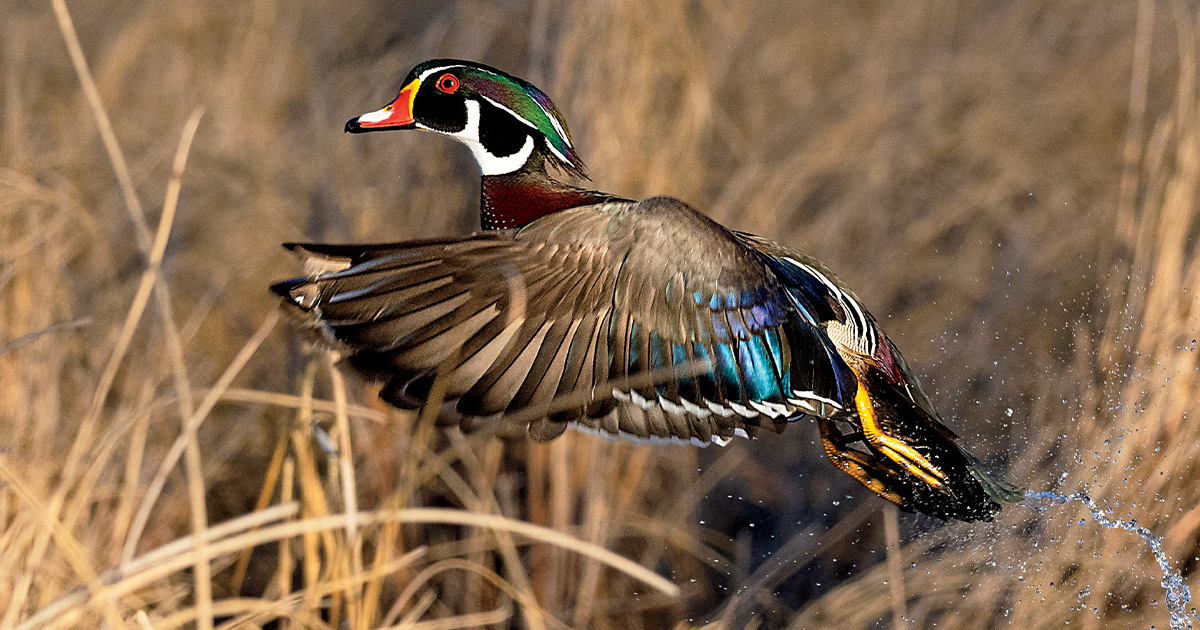Cupped Wings: Closing the Circle
Preparing your game for the table can be a satisfying and meaningful part of the whole hunting experience
Preparing your game for the table can be a satisfying and meaningful part of the whole hunting experience

The wood duck drake is stiff in my hand. It’s been aging for four days, entombed in the refrigerator’s vegetable crisper drawer. From October till the end of January, everyone in my household knows that I take over that drawer, and it likely won’t see another pepper or carrot until close to Valentine’s Day. It took a bit of training to bring my family up to speed—my mother-in-law would attest to that—but I figured out long ago that there’s no better place to age waterfowl than in the veggie drawer. Cold and dry. Right under the milk and snuggled up beside the Duke’s mayonnaise.
Actually, there are three woodies in the vegetable crisper—two drakes and a hen that had sauntered into the swamp as I was about to leave. I pull them out, one by one, and give each a good, solid sniff, the first of two olfactory quality-control checks each bird will have to pass. All good. I walk out the back door with seven things and always seven things: a big bowl full of birds, an Arno Bernard caping knife with a crocodile skin handle, kitchen snips, a garbage bag, a bourbon cocktail, and two dogs dancing at my feet because they know they’re in for some trimming treats.
I have always enjoyed cleaning and butchering game. (Let me clarify: any game other than squirrels. I would rather field dress four warthogs than a squirrel. Those things are wrapped in Kevlar. But I digress.) My game-cleaning ritual is standardized and immutable, a tradition that gives me nearly as much pleasure as the hunt itself. The dogs and I tromp to the backyard treehouse, which has been converted into a decoy and canoe storage complex. My Lab, Minnie, takes a position at my feet. Honey Bee, our rescue dog, which we describe as “beagle in the front and corgi in the back,” hops on the treehouse deck so she can stand at my shoulder. I down a gulp of brown water and set a playlist to the Eagles, and all is right in my world.
It’s important to me that I clean my own ducks. Same with anything I hunt—deer, doves, geese, the works. For starters, I love to cook wild game, and the best way to ensure the best end product is to do it all yourself, from the trigger pull to the freezer. But there’s more going on out there under the treehouse. Plucking ducks takes time. You can’t rush it. There was a time when I wanted to get it over with quickly. Back in the day, I breasted out every duck, peeling the fatty skin off with my fingers, to leave behind a boneless, skinless breast fillet.
Aging ducks in the fridge gives me the freedom to plan my cleaning routine for a time when I don’t have to be in a hurry. As much effort as we all put in on the front side of a hunt, it’s a shame not to savor the rewards on the back side.
I pluck the breasts, legs, and thighs. With the feathers gone, I stick my snout close to the point of the bird’s breast and take another sniff. If there’s anything off with the scent of the bird, I’ll know that it was likely gut-shot, and I’ll fillet the breasts from the bones. If I get a nose full of clean blood smell and aromas of wet duckweed and muck, then it’s a prime bird and worthy of a bit more care.
It’s a bit of a chore, but far less trouble than many make it out to be. And like any job well done, there is satisfaction in the details. I’ve tried all the tips and tricks. Dunking the birds in scalding-hot water and dipping the birds in melted wax. I find that I make a bigger mess by trying not to make a mess. So dry-plucking it is: pull the feathers from the bird, between the thumb and the first two fingers, and pull toward the head. Repeat, repeat, repeat. It’s not that hard until you get to your sixth or seventh duck. Then you are highly susceptible to getting a charley horse in your thumbs, which is just about as much fun as it sounds.
At my feet, Minnie and Honey Bee are having a ball. I hand them tiny bits of skin and meat, and soon they have feathers plastered on their wet noses and snagged in their eyebrows and whiskers. Soon enough, my hands are smeared with blood and look like two poorly plucked chickens roosting on the ends of my arms. I’ll spare you a description of my cocktail glass. Minnie is trying to lick the feathers that are ensnared in her whiskers. Honey Bee eyes the garbage bag like she might take a swan dive into such a fabulous collection of carcasses.
I don’t want to hand this part off to anyone else. Pulling a duck from the vegetable crisper and turning it into food is as much a part of hunting as scouting and cursing the alarm clock. A hunt doesn’t feel complete to me until I close the circle with a vacuum sealer. We take life to sustain life, and finishing the job yourself seems to honor the life that was given.
Minnie and Honey Bee sure think it’s the right thing to do.
Ducks Unlimited uses cookies to enhance your browsing experience, optimize site functionality, analyze traffic, and deliver personalized advertising through third parties. By continuing to use this site, you agree to our use of cookies. View Privacy Policy